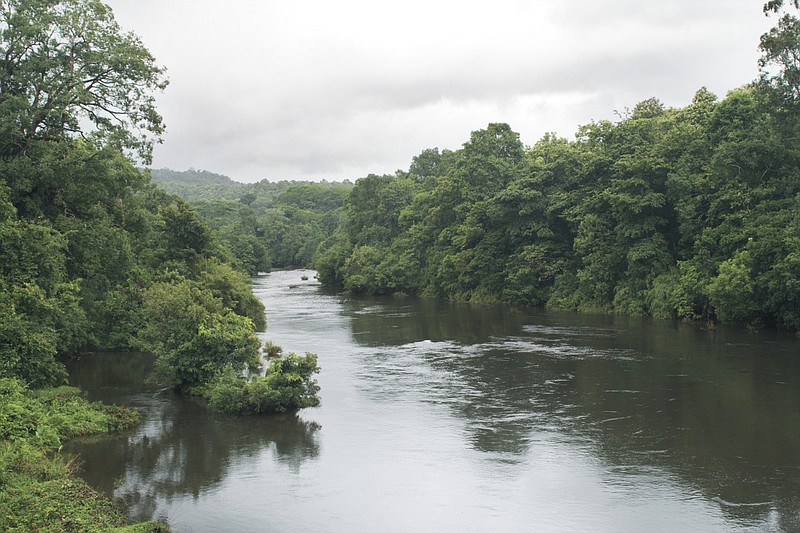Riverbend Water Resources District is considering building a new water treatment plant in New Boston, Texas, that could eventually process all of Texarkana, Texas' water.
The option, which calls for a plant to be built at TexAmericas Center, was included in the Regional Water Master Plan Riverbend that consultant Susan Roth presented in Hooks, Texas, last week at the water district's town hall meeting.
The new plant would be constructed in phases, with Phase 1 to be completed in 2020, and include a new raw-water intake on Wright Patman Lake, a raw water line and a pump station. That phase would initially serve TexAmericas Center and Riverbend's 16 member entities. By 2025, Roth projects that the plant would serve 50 percent of Texarkana, Texas' water demands. The New Boston Road water treatment plant would serve the city until 2030 and be decommissioned in 2035.
The project is estimated to cost $285 million, which will be paid for by the water district's member entities, according to Riverbend Executive Director/CEO Liz Fazio Hale.
"Riverbend's priority is to build out infrastructure as needed to keep rates affordable for consumers," she said. "We need to let growth pay for growth."
Riverbend took over the wet utilities at TexAmericas in 2016, with the contract that requires a minimum of 6 million gallons per day of raw water to be delivered to the footprint by May 1, 2026, and eventually provide an additional 19 mgd, for a total of 25 mgd.
Hale said that while they could accomplish this by making repairs and additions to the 50-year-old New Boston Road plant, it can only function at a 18 mgd capacity, and Roth's study showed it was built in a flood plain.
"That provided some challenges to building out," she said, adding that Texarkana Water Utilities has maintained the plant very well, but that at the best operation, it is likely to last only another 30 years.
It was initially assumed the plant would be able to produce a maximum of 24 mgd, but Roth recently learned otherwise.
"Things have changed with this discovery," and officials are thinking about "where we want to be in 50 years instead of 30 years," Hale said. Even if changes were made to the plant, she said they wouldn't be able to address water taste and odor issues.
"There is new technology; better ways to treat the type of water out of Wright Patman have been developed in the past 50 years," she said. The lake lies at the end of the Sulphur River, which is named appropriately and has a strong taste and odor. The new technology planned for the proposed plant would be a benefit to all its users, Hale said.
"Building a new water treatment facility would address all of those things," she said. "Initially, it's going to be more expensive, but over time, what you're hoping for is the treatment of the water is actually less expensive because the technology has developed to treat the type of water at Wright Patman more efficiently."
The new plant would also help TexAmericas to attract new businesses, according to Executive Director/CEO Scott Norton.
"Being a large industrial park, one of the utilities we desperately need to recruit large industry on our footprint is raw water," he said. TexAmericas has potable water for drinking, but raw water is not available. He said they have been able to acquire the two other things they needed-natural gas and fiber connections-and that getting raw water there is the next step to getting big business to occupy the property.
"If that utility was available to us, that would greatly help us in recruiting those big businesses. Food processors use a lot of raw water. So do steel manufacturers and processors. Bringing those here would bring good paying jobs to support the entire area," he said. "If a major industry is going to invest $500 million into a new manufacturing facility, they're not going to do it on us hopefully having the raw water. They want to know it's available to connect to."
He added that a recent analysis of workforce needs showed the area would be a great fit for those types of industries.
When creating the regional water plan, Roth included a significant increase in the anticipated amount of water used for industrial purposes and presented those numbers to Region D water planning group the day after the town hall meeting. The group agreed to send the new numbers to the Texas Water Development Board to be included in the 2021 state water plan.
For now, the New Boston Road plant is running as usual, said J.D. Phillips, executive director of Texarkana Water Utilities. He said they haven't yet met with Shirley Jaster, the new city manager, to determine what their next steps are.
"We knew they were looking at things and doing long-range planning but didn't know what they were going to recommend at that time," he said. "I just haven't sat down with her yet."
Hale said ultimately, Riverbend's member entities and Board of Directors will decide if the new plant will be built.
"Everyone and anyone who wants to provide feedback to Riverbend has the opportunity to do that now. The process is extremely important to the Board of Directors, and they want ample opportunity for the process and stakeholders and community to give feedback," she said. "The No. 1 driver is what is affordable for our community."
Roth's presentation is on Riverbend's website at bit.ly/2hjBb1v.
Riverbend's next meeting is scheduled for 12 p.m. Nov. 22 at their offices, 228 A Texas Ave., New Boston.

